- Home
- Hanif Kureishi
The Last Word Page 3
The Last Word Read online
Page 3
In the late morning Liana would bring Harry his coffee, along with half a baguette and some sardines. A woman of Rome, who had spent time in India with Mamoon, Liana wore bright shawls, vibrating bangles and heavy rings, along with wellington boots in various colours for tramping through the mud and rain, which was, Harry was learning, what people who lived in the country appeared to do a good deal of the time. Her overcoats – often in fur, and fashionably spattered with mud, creating a Jackson Pollock effect – looked expensive.
‘How’s darling misery-guts Peggy?’ Liana asked Harry, patting the pile of diaries and sitting right next to him. ‘Is she drunk again?’
Harry, from an academic family, had always been capable of hard work, of bearing a large load of necessary boredom. However, he was finding the diaries both alarming and monotonous, particularly the later pages where Peggy enjoyed describing her numerous symptoms: brain-splitting migraines, stomach aches, her fear of cancer, and her regret. There had been an abortion; she had allowed Mamoon to mistreat her. She had turned away; she hadn’t insisted sufficiently; she had been weak with a strong man. She had been masochistic, even. Her OCD, her desire to slit her wrists and so on, would be interleaved with, ‘I love my solitude, but fear I’ll go mad. I love to read but it’s not enough. Here, in the country in the winter, when it is dark at three, things can get very dark with me. I drink, and fall over and wake up on the floor in my own vomit. If Mamoon saw me, he would be appalled. But he disappeared on a book tour, where he meets only sycophants and pussy, as he puts it. Now he is sleeping with one of the women – Marion – on another continent. Kindly, he informed me she is the first woman who truly knows how to satisfy his renewed appetite. I never quite achieved that, apparently. He loves her soft body, her mouth on his cock, and the way, since the word “no” doesn’t agree with him, she is ready for him whenever he wants her.’
‘Didn’t you read them?’ Harry asked as Liana looked at a photograph of Mamoon he had found.
‘I wish I could have known him then,’ she said. ‘I could have saved him. But grazie a Dio, why would I read them?’
Liana sounded like Mamoon, but he didn’t sound like her. With her Indian-inflected English in an Italian accent, Liana had a loud abrupt voice, like the wind tearing at your hair, particularly when offended, and there was usually something offending her. Even her emails were loud.
‘Curiosity?’ he said.
‘I am living the damn dream here.’
Before Mamoon she’d had two miscarriages, a fierce marriage and a divorce. Alone in a small flat in Rome, near the Tiber, ten minutes from the Piazza del Popolo, she went to discos, loved to drink, made love when she could—
‘With whom?’ he said, making a note.
She held his arm and whisperingly told him that she worshipped all forms of sexual expression. But dressing up and dancing could make her light up the city with erotic love. At that time she liked younger men.
‘Of which age?’
‘Late twenties, tesoro. They are still playful then, and their bodies are lovely, and still firm. Their minds are almost grown up.’
At night she sat at her window reading Turgenev and thought she was done with serious passion. Then, by chance, one day the maestro was generous enough to stroll into the little English bookshop she managed. She recognised him right away and was ecstatic. His books were her truth, and he was her kismet. Though she was shy, and had hair like a witch’s web, she could do nothing but beg for his signature, for him to touch her book with his actual hands – the ones that held the pen of genius. He wrote down his number.
She informed him, the second time she saw him, as they strolled in the sunshine in his favourite place, the Villa Borghese, that she had fallen in love with his primal creative power. He was relieved. He was parched. He took her to dinner. She wore her blue lace skirt. She had never had a dark man. They made love with their eyes. He played the man part well, and invited her to his bed. Though he was a little older than she was used to, what could she do but open herself to him? She was pleased that he was not just a talker like some clever men. In her experience intellectuals were not sufficiently devoted to sex, with weak erections and watery, even frothy semen. But Mamoon undressed her slowly, he knew how to look at her body and let her show herself to him; he knew what to say about a woman. He kissed and caressed her feet, and had her at least three times.
In the morning he kissed her coffee mouth. He said he loved that taste on her, of bitter black coffee. She had happily stayed in his arms ever since.
‘God didn’t grant me children, Harry, but He granted me Mamoon when I thought it might be too late! For a time, I could come just by thinking of him. Can’t we throw Peggy and her diaries away and live the life of the living? I am Tolstoy’s wife: it is like running an estate, this place!’
‘Did Mamoon read the diaries?’
‘Why, are they so shocking?’ She said, ‘He wasted his life attending to that poor woman who killed herself just to spite him. Why would he want to fritter away another moment on such a spoilt and sullen creature?’
‘He acknowledges in interviews that the two of them worked together on his manuscripts. She was the only person who wasn’t afraid to edit him.’
‘See how kind he is, praising her when we know the truth – that it was obviously all his work!’
Harry said, ‘Perhaps she was like the Beatles with George Martin – impossible to subtract from the work.’
‘Please, stop these stupid distractions. You know we are in need of a career boost up. I can tell you, to help the finances even more, I am going to write my own book. If I let you see some of it, you can offer advice.’
‘I’d love to. But Liana, I must speak to Mamoon if I’m to make a picture of him alive, here and now. Otherwise I think I will pack right up and go home at the weekend.’
‘Acha, tonight then,’ she said.
They would have a proper supper and Harry would join them.
At seven thirty a bell was rung downstairs. Harry left his work. He learned that Liana liked the round supper table by the window to be properly laid with crisp napkins, shining cutlery, candles, and the best champagne and wine. She was in jeans and a V-neck jumper, and Mamoon wore a fresh shirt. When Harry entered, Liana glared disapprovingly at his raggedy T-shirt, which he would be sure never to wear again, or would perhaps incinerate. Their housekeeper, Ruth, who had veined arms and a grey, bitter mouth, and was wearing black with a white apron, served them silently. Her sister was cooking.
Harry had heard from Rob that being merely a literature lover, Liana had had inflated ideas about Mamoon’s standing and wealth, with little notion of what the life of a professional writer was like. She’d been shocked by how modest an income his books actually generated. A small but lofty reputation didn’t translate into cash. Her accountants had told her that unless things improved, the couple would, in the near future, have to sell the house and land and move somewhere smaller. ‘Perhaps to the lowest of the low, Harry – even a bungalow!’
It became clear that Liana had convinced herself that the solution to this was for Mamoon to become, as she put it, ‘a brand’. Harry was amused to learn that Mamoon, who said little at supper, appearing to park his mind somewhere more congenial and with a better outlook, wasn’t sure what being a brand entailed.
‘Brand, did you say, darling habibi? Would I have to become like Heinz ketchup or a Mont Blanc pen?’
‘Not ketchup, no, but more like brand Picasso,’ she said. ‘Or Roald Dahl. Crowds of people are in and out of that dismal little shed every five minutes, paying through the nostrils.’ When Mamoon pointed out that Dahl was long dead, Liana said, ‘Never mind that – he is alive in people’s minds. We must sell you better so you are similarly alive.’ She nodded at Harry. ‘This biography will be a good start. Don’t we quite like nice Harry?’
‘The boy has a powerful forehand.’
‘Mamoon, I have to remind you over and over that you haven’t been
fairly remunerated for your genius. I go to meetings with our accountants and I can tell you, they may not have read your books, but they have looked at your figures and sighed.’ She took his hand, kissed it, and rubbed it against her neck. ‘Darling, an essay on Tagore won’t repair the jacuzzi.’
Mamoon winced and leaned forward. ‘We have a jacuzzi?’
At least Liana was trying – to sell the film rights to his books; to use Mamoon’s contacts to set up a cookery programme for herself; and to persuade him to give a lucrative lecture tour in the US. She was also intending to ‘pen’, as she put it, a novel about a beautiful, Italian woman who falls in love with a genius. Harry would, he’d been informed, help her with this task. Who these days, apart from old-fashioned Mamoon, bothered to write their own novels, any more than they designed their own houses? Would Harry read what she’d done so far and make suggestions?
Harry got up and went out into the yard for a smoke. Liana followed him, saying, ‘Why did you make that distasteful face in my house? Mamoon lives in a dream world! If I didn’t protect him, he’d be broke. Don’t forget you’re here to show the world what an artist is.’
‘That’s what I’m trying to do.’
‘You know, Harry, I get a little tired of you sniffing around listening, suddenly coming up with a sly question about what happened whenever and why. Let me ask you a question. How many bedrooms were there in the house you grew up in?’ When he hesitated she went on, ‘There you are. You can’t remember. Five? Six?’
‘It was a Norman Shaw house, in Bedford Park, in Chiswick, West London. They were a bit run down. Dad sold it when I went up to Cambridge. Silly really, as those houses are worth millions now and film stars live there.’
‘But your father was a surgeon.’
‘He was a doctor, and became a psychiatrist, working first in an asylum and then in a hospital.’
‘Salaud – never mind that! Mamoon and I have had to work like dogs to achieve all that we have, while you were brought up in the top one per cent of the world’s population. In another time, Harry, you’d have become a politician, a diplomat, an economist or a banker. What went wrong?’
‘It’s all gone right. We were brought up to feel at ease with mad people. Dad would invite his former patients over to the house. Some stayed with us. Dad encouraged us to follow them into their delusion, which he called their story, the narrative which held them together. What was called their madness was really their writing.’
‘What has this got to do with my husband?’ she said.
At one time, he explained, while the Left was railing against imperialism and American influence, and often supporting Third-World fascists, Mamoon interviewed and wrote about powerful politicians, dictators and bearded mass murderers who had, on occasion, personally beheaded their enemies that morning – men who wrote their ‘novels’ in the blood of the people. Mamoon understood this to be a form of story-telling, the making of history by writing. His voice was cool, never judgemental but morally firm. He understood the need for dictators, prophets and kings, and our love for them. ‘And anyway, Liana,’ Harry went on, ‘while we’re talking about my family, my long dead mother ran a bookshop for a time.’
‘Oh you poor thing. Do you miss her?’
‘Every day.’
‘Do you speak to her?’
‘Yes. How do you know that?’
She shrugged. ‘The hills are a radio. There are voices everywhere. This house is an ear. Did you hear Mamoon speaking at night?’
‘Not yet, no.’
‘I think you will.’
‘That would be better than nothing,’ he said.
Four
Harry was waiting for a way in. It would happen, he knew. He had to be patient.
Meanwhile, during the following week, he found the routine he needed: reading diaries, letters and papers in the barn until one o’clock, when Liana would announce lunch.
Then, one day, he saw Mamoon in a green velour tracksuit heading for the garden carrying weights. Harry figured that he would be mistaken if he believed for a moment that Mamoon’s vanity, or his competitiveness, had declined with age. In the mid-afternoon, after it had occurred to Harry to invite Mamoon to stretch, run a little, work out a bit, and warm down with him, he learned this would be an opportunity for him to enter the old man’s confidence. Mamoon loved dressing in a variety of sports gear and was keen to kickbox and learn some capoeira moves. ‘If, or rather when, all else fails,’ puffed Mamoon, ‘you could become my personal trainer.’
In the early evening Harry would talk to Liana and help her make supper, before writing up his notes. Later, when he could no longer concentrate, he would become restless. Sometimes he ate alone in a local restaurant, with a book in front of him. If he was lucky, Mamoon would shout out his name, inviting him into the television room. Mamoon was proud of his television, which he called ‘Pakistani’, since it was vastly out of proportion to its surroundings and characteristic, he liked to believe, of deprived immigrants crouching in front of it like primitives contemplating the transit of Venus. Rob had prepared Harry for these whisky sessions, saying that it was in confrontation with the TV that Mamoon came into his own. For most of his adult life, Mamoon had been his own kind of radical, going to some trouble to mock and invert political correctness, rebelling against the fashionable contrarians of his day, hippies, feminists, anti-racists, revolutionaries, anyone decent, kind or on the side of equality or diversity. This was, for a short time, an unusual and even witty idea. Now Mamoon was as bored by this pose as he was by everything else. Occasionally he would try a provocation. ‘Look at that ugly lazy black bastard,’ he’d say, as, instructed by Liana, they drove into town to pick up some local cheese, and having noticed what looked like a shy but enthusiastic African student visiting local churches. ‘Off to rob, rape and mutilate a white woman’s cunt, no doubt.’ But Harry felt Mamoon’s heart wasn’t in it, and that he preferred to ask simple questions about things which genuinely puzzled him. ‘Tell me, Harry, what exactly is Happy Hour? What is lap dancing and the X Factor? What is wiffy?’
‘Wiffy? Oh, wi-fi.’
Mamoon adored Indian and, even, Pakistani cricket. He had loved, on first coming to Britain, to watch English county cricket on provincial grounds. Monday morning in chilly weather and a light rain, a train ride from London, he would sit down on a bench with a Thermos and a cheese sandwich to watch an obscure game. One wall of his library was covered with pictures of post-war players. In pride of place, though, Mamoon kept a framed photograph of the 1963 West Indian cricket team. Rob had told Harry to be sure to tell Mamoon that his uncle had captained Surrey, and had instructed him to prepare Mamoon by never turning up without either gossip or DVDs of his heroes, Rohan Kanhai, Gary Sobers, Wes Hall, and, from a later period, Malcolm Marshall, Gordon Greenidge, Alvin Kallicharran, and Vivian Richards. It didn’t bore Harry to repeatedly watch them with Mamoon, or even to hear him say, ‘Oh good shot, sir,’ like any other English buffer. Sport, which was unpredictable and existential, and where men were truly tested in the moment, was more important than art, which was ‘soft’. Bowling at Lord’s, taking a penalty at Wembley, playing at Wimbledon, that was ‘the definitive’, as Mamoon called it. ‘If one had played a shot like that at Lord’s, one would die happy, don’t you think? I am a poor entertainer compared to it.’
Mamoon was chatty and alert when he watched football, and liked it if Harry sat with him, drinking whisky and discussing the players and managers. ‘Watching the World Cup with Nietzsche,’ Harry called it, having realised he learned more about Mamoon listening to him discuss the future of Manchester City than by interviewing him about his books, or his ideas on colonialism. Harry’s questions were, at the beginning, gentle and general, and Mamoon made no attempt to conceal his boredom. ‘When did you know you were a writer?’ ‘But I don’t, even now.’ ‘Did you love your father?’ ‘Too much. I was a son rather than a man.’ ‘When did you become a man?’ If a question seemed imp
ertinent or irritated him, Mamoon said nothing but stared into the distance, waiting for the fatuity of the enquiry to occur to Harry.
While Harry sat with the great man, he ruminated on the writers he had grown up loving. Forster, tearing colonialism apart, absurdity by absurdity; a serious Orwell; Graham Greene, prowling around, looking for trouble and death; Evelyn Waugh, who saw almost everything, and hated it. Mamoon was one of the last of that sort, and of equal merit, in Harry’s view. And Harry was in his house; he was walking and discussing seriously with him; he would write his life. Their names would be linked for ever; he would have a small share in the old man’s power. But biography had learned a lot from the scandal sheets; it had been sucked towards the dirty stuff, a process of disillusionment. Unmasking was the thing, leaving just bleached bones. You think you like this writer? See how badly he treated his wife, children and mistresses. He even loved men! Hate him, hate his work – whichever way you looked at it, the game was up. The question had become: what can we forgive in others? How far do they have to go before we lose faith in them?
Harry had loved most of the arts long enough to know that artists had to be excused failings which would condemn the general population. The artist was the proxy, the brave one, the one who spoke, was thanked, and who paid the price. Artists were allowed, indeed encouraged, to lead more libidinous lives on behalf of others who had, of necessity, to leave their jouissance at the door while they worked. And as Harry began to read through the material in the barn, he became aware that he was thinking about the matter Rob had specified. What would he do with Mamoon? Who can think of Larkin now without considering his fondness for the buttocks of schoolgirls and paranoid hatred of blacks – ‘I can hear fat Caribbean germs pattering after me in the underground . . .’ Or Eric Gill’s copulations with more or less every member of his family, including the dog? Proust had rats tortured, and donated his family furniture to brothels; Dickens walled up his wife and kept her from her children; Lillian Hellman lied. While Sartre lived with his mother, Simone de Beauvoir pimped babes for him; he envied Camus, before trashing him. John Cheever loitered in toilets, nostrils aflare, before returning to his wife. P. G. Wodehouse made broadcasts for the Nazis; Mailer stabbed his second wife. Two of Ted Hughes’s lovers had killed themselves. And as for Styron, Salinger, Saroyan . . . Literature was a killing field; no decent person had ever picked up a pen. Jack Nicholson in The Shining had the right approximation of a writer. If Harry showed merely a decent man rather than a mercenary, he wouldn’t be believed. No one wanted that: it didn’t get anywhere near the hate, heat and passion of a real artist.

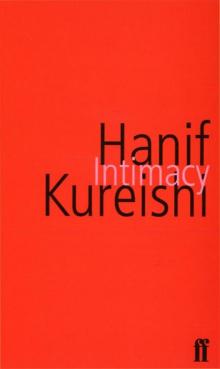 Intimacy
Intimacy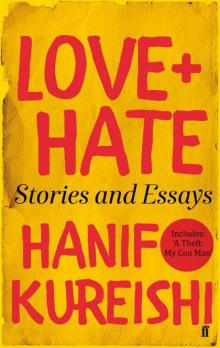 Love + Hate: Stories and Essays
Love + Hate: Stories and Essays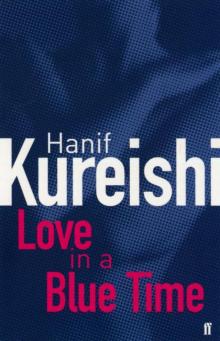 Love in a Blue Time
Love in a Blue Time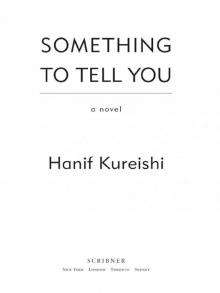 Something to Tell You
Something to Tell You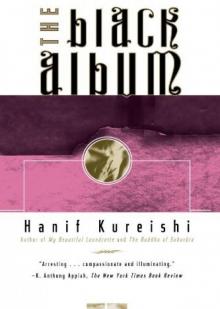 The Black Album
The Black Album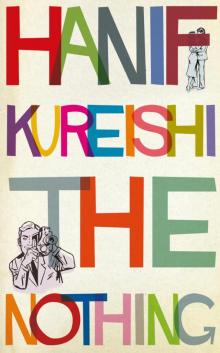 The Nothing
The Nothing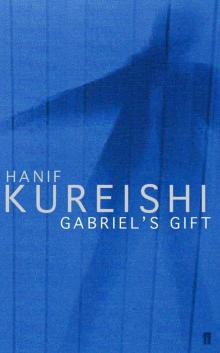 Gabriel's Gift
Gabriel's Gift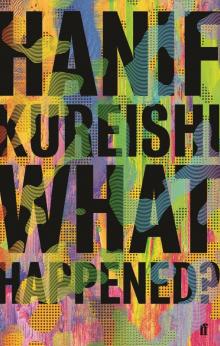 What Happened?
What Happened?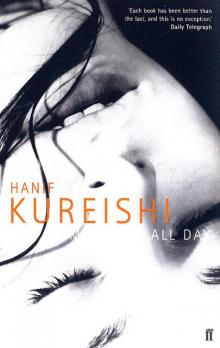 Midnight All Day
Midnight All Day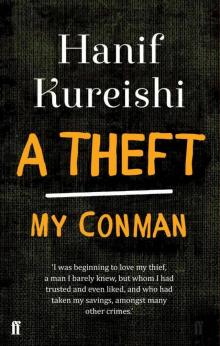 A Theft: My Con Man
A Theft: My Con Man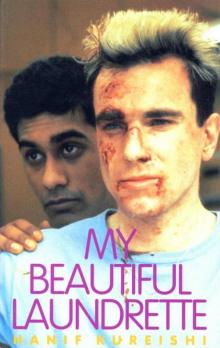 My Beautiful Launderette
My Beautiful Launderette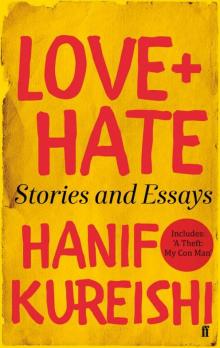 Love + Hate
Love + Hate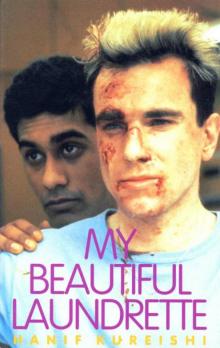 My Beautiful Laundrette
My Beautiful Laundrette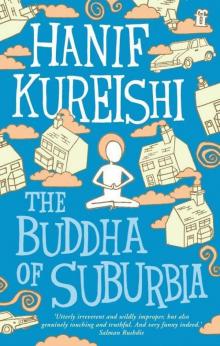 The Buddha of Suburbia
The Buddha of Suburbia